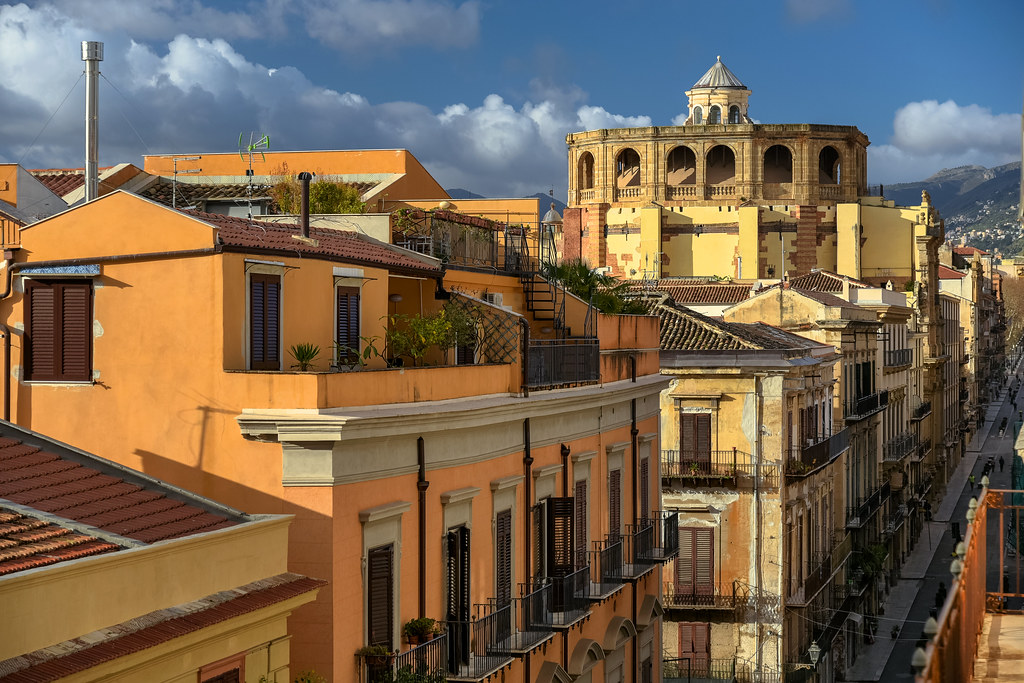Territorial control is a crucial activity for many criminal organisations. Italian mafias, in particular, consider the territory they originate from as a crucial resource. It is the place they wield an extra-legal political authority, recruit members, extort illegal tributes, and operate as brokers within the local community. While globalisation has increasingly produced the ‘mafias on the “move’, it has not slackened the links between criminal organisations and their original territory. The impact of coronavirus on the Cosa Nostra offers but one example of the complex relationship between organised crime groups and territorial governance.
The regulations enforced by the Italian government on the 8th March 2020 basically consist of a total lockdown, with people only allowed to leave the house for basic needs such as food shopping. On the 26th of March, in a discount shop located in a residential area of Palermo, the police had to intervene when 20 people, who, after filling their carts with as many goods as possible, tried to leave the shop without paying, acting aggressively towards the staff. The looters claimed they could not pay because the presidential decree, by forcing people to stay home, had left them jobless. They also pointed to the poetic justice of looting shopping centres owned by French and German companies, as France and Germany are held responsible for not helping the ailing Italian economy at an EU level.
With the looters arrested, further investigations have brought to light two important points. Firstly, such episodes are not limited to Palermo, but have been widespread across many others shopping centres since the lockdown decree has been enforced. Secondly, some magistrates have argued that there is clear evidence of the active role of the Cosa Nostra in the lootings. Such allegations have raised the concerns of the public, so much so that the Prefetto – the local chief of Police forces – decided that all the shopping centres of the Sicilian capital had to be patrolled by the Police.
To outsiders, the Palermo magistrates’ allegation might seem odd. The Cosa Nostra, despite the crisis experienced in recent years, remains one of the most powerful and dangerous criminal organisations in the world. Their activities operate on an international level, spanning from drug trafficking to construction infiltration and fraud. Moreover, the links between the mafia and local politicians, entrepreneurs and politics are still a matter of fact. Why would they get involved in looting?
The impact of coronavirus on the Cosa Nostra offers but one example of the complex relationship between organised crime groups and territorial governance.
Looting: why would Cosa Nostra be involved in such a marginal, underclass activity?
The first reason is self-evident, as it relates to the links between criminal organisations and their territory: either as a power syndicate, mainly controlling the territory, or as an enterprise syndicate, running illegal activities, the Cosa Nostra cannot help but be involved in the lootings. The Mafioso might not organise the lootings themselves, but it is very likely that they wield some regulatory power over those involved. This is by the very nature of their control over the illegal activities that take place in their territory, and to make sure that things do not spin out of control. This is even more relevant to the Sicilian Cosa Nostra, which originates as an organisation organising and supervising the political and economic life of latifundia (land estates) on behalf of landlords. Now, more than ever, the Cosa Nostra cannot afford to loosen their grasp over their territory.
The second reason the Cosa Nostra are likely to have a hand in the lootings is because of the socio-political control the organisation wields in its territory. The Sicilian mafia has built consent among the local population by operating a patronage-oriented policy. Pensions, council flats, employment and benefits are often made possible because of the Cosa Nostra’s reach with local politicians. This activity has been part of an electoral trade off, with the mafia supporting those candidates compliant with patronage-oriented policies. Although gradual public expenditure cuts have shrunk the resources accessible to public via the Cosa Nostra’s political connections, patronage remains a significant source of socio-political control. This trend has been exacerbated by the coronavirus emergency, which has diverted even further resources to face the current health problems. As a consequence, the Cosa Nostra’s access to public resources has so far understandably shrunk.
In recent years, Italy’s austerity has limited the Cosa Nostra’s access to public resources, but they will have a big role in the allocation of aid dispensed to ease the impact of coronavirus.
Moreover, as some of the looters claim, employments in nero (literally: in black, that is legal employment without a formal contract), have always constituted a large part of Southern Italian and Sicilian workforce. Some authors have shown how the local criminal organisation plays a significant role in regulating the labour market, including recruitment, wages and working conditions. For those workers without a formal contract, like the ones employed as a result of mafia connects, the immediate consequence of the government decree of the 8th of March was the termination of employment, without any economic shelter.
Poverty has immediately increased in the most depressed areas of Italy, such as Southern Italy and Sicily. This has forced a dramatic soar in applications for the reddito di cittadinanza, or “citizenship income”. As a benefit reserved for only the poorest families, first introduced by the Conte government in 2018, these rising figures show how coronavirus has brought about an immediate worsening of economic conditions. Even pope Francis, in his public discourse of the 27th of March, warned about the consequences of growing poverty in the most depressed areas of the country. His appeal has been proven by not just the looting in Palermo, but other similar episodes in the South. Organisations like the Cosa Nostra, thanks to a firm grasp over their territory, can easily promote themselves as a stakeholder of looting, regulating the access to this illegal practice by different small groups, and thus reinforcing its own role of extra-legal power.
Cosa Nostra are motivated to be involved in the lootings by regulating the activity and thus, once again, reinforcing its role of intermediation between the legal and the illegal society. Soon the emergency will be over, and new resources will be allocated by the government to rescue the ‘economic’ victims of coronavirus, not least the unemployed, homeless and disabled. As ever, the Cosa Nostra will be there, with a heavy hand in the allocation of these resources. Recovery, ironically aimed to increase public resilience, will probably only increase its power and its wealth.
Vincenzo Scalia is a SHOC Member and Reader in Criminology at the University of Winchester. His research interests include organised crime, terrorism, police culture, urban security, penology. His works have been published in Italian, English, Spanish, Turkish.
Main Image Credit: Jorge Franganillo, via Flickr.
The views expressed in this article are those of the author(s) and do not necessarily reflect the views of RUSI or any other institution.



